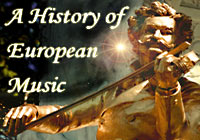A History of European Music, Part 5

Finland was a part of the Russian Empire from 1809 and the Napoleonic Wars to independence during the revolutions in 1917, but it had been a part of the Kingdom of Sweden for centuries before this. ComposerJean Sibelius (1865-1957) was born to a family from the Swedish-speaking minority. He became a committed patriot and learned the Finnish language, abandoned his law studies at Helsinki and devoted himself entirely to music. He was especially fascinated with Finland’s national epic, the Kalevala. From 1897 to the end of his life he was supported by the Finnish government as a national artist. His major tone poem Finlandia was written in 1899, but because of its nationalistic-sounding name it had to be renamed so as to avoid Russian censorship. Sibelius was original in his treatment of form and reworked the sonata form in novel ways, some of which were anticipated in the Prelude to Wagner’s Tristan and Isolde. He drew inspiration in his work from the Nordic landscape, as did the prominent Finnish architect and designer Alvar Aalto (1898-1976).
A History of European Music, Part 4






















